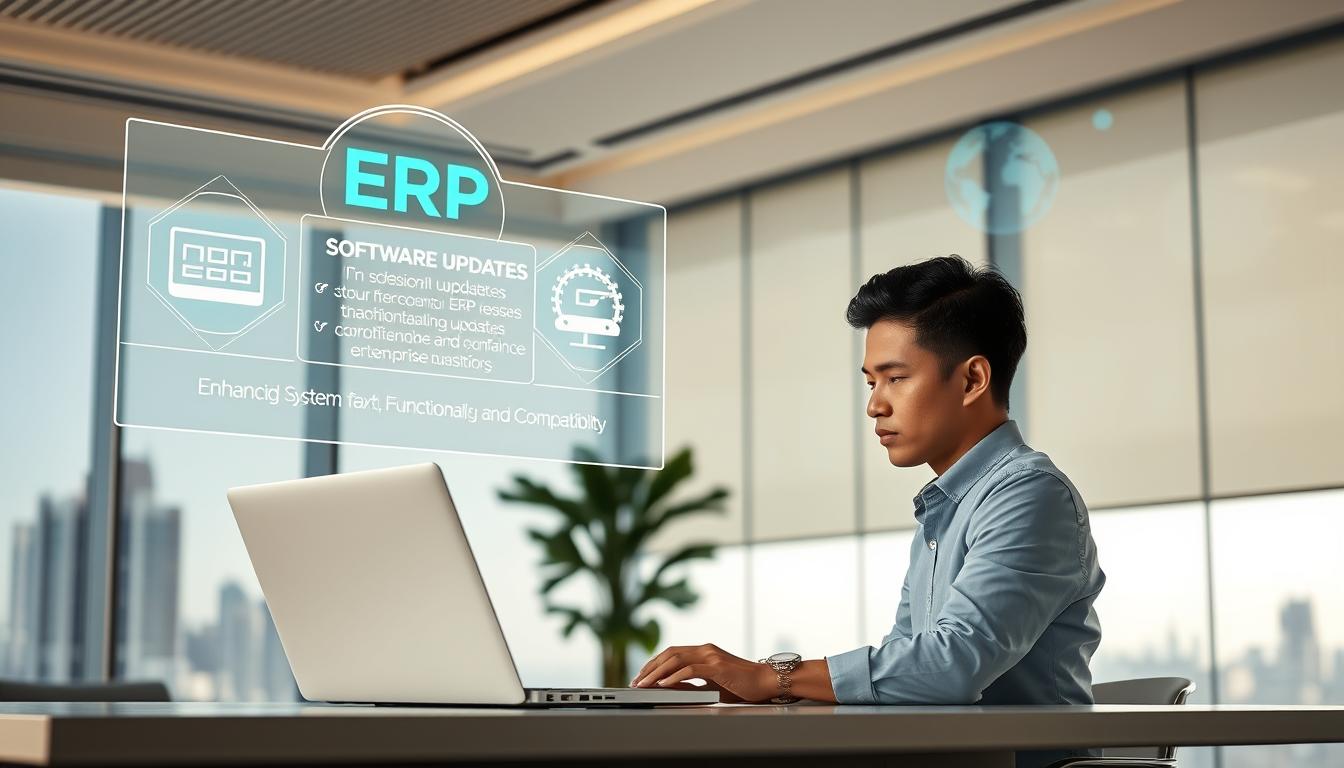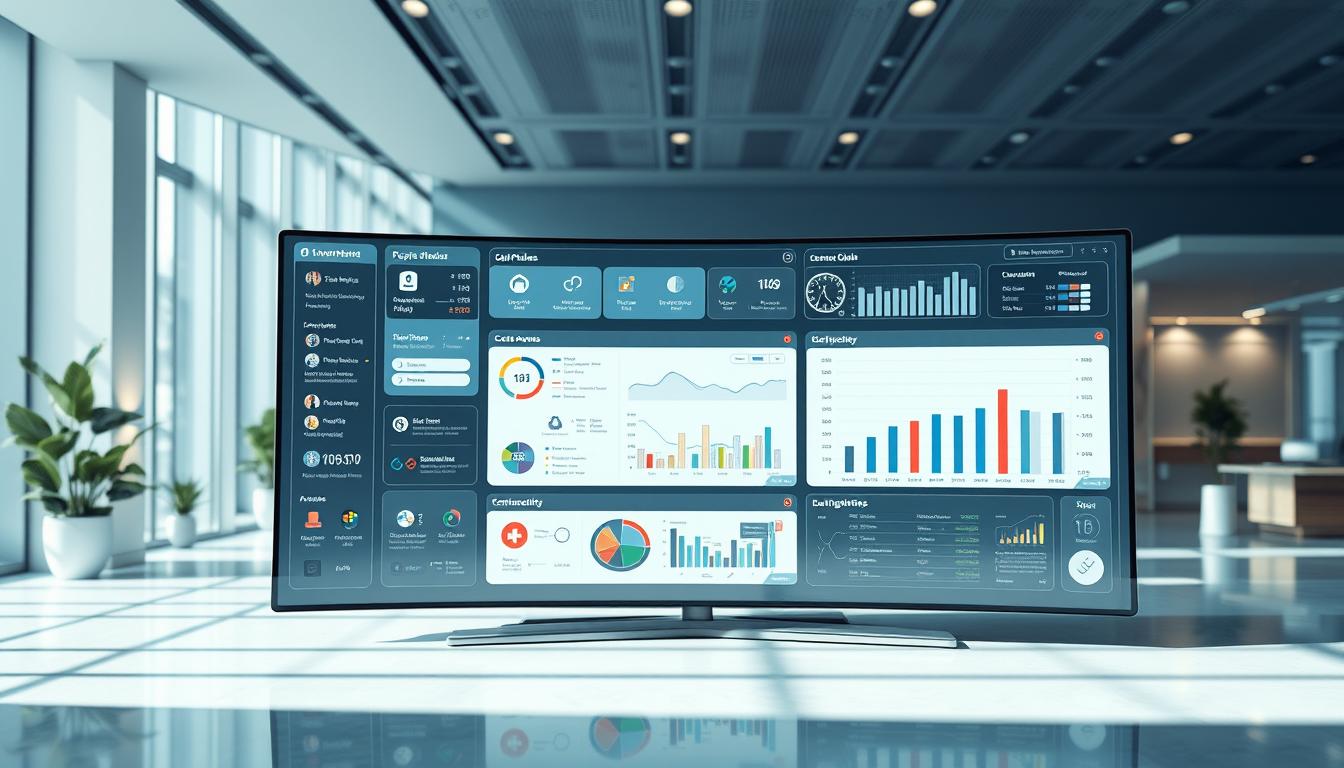What if not updating your ERP system could cause big problems? In today’s fast world, keeping ERP systems updated is very important. These updates help keep systems running well and safe.
In the Philippines, businesses have special needs. They need help to keep their ERP systems up to date. An old ERP system can hurt work and make it harder to keep data safe. This article talks about why updates are key for ERP systems to work their best.
Key Takeaways
- Regular software updates enhance the overall efficiency of ERP systems.
- Keeping ERP systems up-to-date reduces vulnerabilities to cybersecurity threats.
- System improvements through updates are necessary for maintaining compliance with industry standards.
- Post-implementation support plays a key role in ensuring successful ERP functionality.
- An updated ERP system supports better decision-making and strategic planning.
Understanding ERP Systems
Enterprise Resource Planning (ERP) systems are key tools for managing an organization’s resources well. The ERP systems definition includes software that ties together main business functions. This helps companies run smoother and work better together.
What are ERP Systems?
ERP systems bring together important business areas like finance, supply chain, and human resources. They automate tasks and make data more accurate. This makes work flow better and helps companies change and grow.
Benefits of ERP Implementation
ERP systems bring many benefits to organizations. Some key benefits of ERP are:
- Improved operational efficiency through integrated processes.
- Enhanced reliability of data, resulting in better decision-making.
- Scalability that supports business growth and adaptability.
- Real-time access to critical information for timely and informed choices.
These benefits help businesses in the Philippines and worldwide stay ahead and react quickly to market changes.
The Role of Software Updates in ERP Systems
Regular updates for ERP software are key to keeping systems efficient and adaptable. With each update, businesses get better functionality that meets their changing needs. These updates not only improve current features but also add new tools for better user experience and performance.
How Updates Enhance Functionality
ERP software updates improve functionality in several ways. They listen to user feedback to make features easier to use. They also add new modules or features to support specific business processes.
In places like the Philippines, small to medium enterprises use many software tools. Updates keep ERP systems up-to-date and ready for today’s challenges.
The Importance of Compatibility with Other Systems
Keeping systems compatible is crucial for businesses using many software tools. ERP updates ensure these systems work well together, like with CRM software. This smooth integration boosts business efficiency.
Without updates, older versions might not work with new systems. This could lead to lost productivity and data problems.
Enhanced Security Through Regular Updates
Regular updates are key to better ERP security. As threats grow, businesses must keep their data safe. An updated ERP system boosts security, making it safer for sensitive info.
Addressing Cybersecurity Threats
Cyber threats are a big worry for companies, mainly those with sensitive data. Updates act as a shield, fixing system weaknesses. Keeping up with updates helps avoid data breaches and attacks.
Protecting Sensitive Data
Keeping data safe is crucial, more so for ERP systems handling private info. Regular updates strengthen defenses against unauthorized access. This protects sensitive info, keeping it safe from breaches that could harm the business and its clients.
Access to New Features with Updates
Regular updates to ERP systems are key for businesses. They bring new features that boost functionality. These updates help companies stay ahead by using the latest tools.
Innovative Tools and Functionalities
Every update brings new tools to streamline processes. For example, AI analytics give deeper insights into customer behavior and efficiency. These tools help businesses adapt fast, making workflows better and more productive.
Maintaining a Competitive Edge
In the competitive Filipino market, ERP updates offer big advantages. They help improve supply chain management and customer service. This leads to happier customers and keeps businesses competitive.
Improving Regulatory Compliance
Keeping up with changing rules is key for businesses to thrive. Updating ERP systems helps companies follow new laws smoothly. This way, they avoid risks and keep operations running well.
Keeping Up with Industry Standards
It’s tough for businesses to keep up with rules in finance and healthcare. They need ERP systems that update on new laws quickly. This helps avoid mistakes and makes work better.
Avoiding Costly Penalties
Not following rules can cost a lot, both in money and reputation. An updated ERP system helps automate compliance. This makes work easier and lowers the chance of getting fined.
| Regulatory Requirement | Impact of Non-Compliance | ERP Compliance Solution |
|---|---|---|
| Data Privacy Regulations | Heavy fines and legal issues | Automated data protection updates |
| Financial Reporting Standards | Inaccurate financial statements | Real-time financial data tracking |
| Health and Safety Regulations | Health risks and liability | Compliance status dashboards |
Performance Optimization with Regular Updates
Regular software updates are key for better ERP system performance. They help reduce downtime, which can hurt operations and productivity. Keeping your system up-to-date ensures it runs well and efficiently.
Reducing System Downtime
Regular updates lower the chance of system failures. They fix bugs and compatibility issues, cutting downtime. This lets employees in the Philippines work without breaks, boosting productivity and morale.
Improving User Experience
An optimized system means better user experience. Updates bring faster interfaces and quicker responses. When users can easily use the system, they serve customers better.
Looking into effective integration strategies can make these experiences even better.
Post-Implementation Support for ERP Systems
Post-implementation support is key to using ERP systems well. ERP vendor support is vital, offering ongoing help. This ensures businesses get the most from their systems.
Vendors help solve problems after the system is live. They help keep businesses running smoothly and update software easily.
Importance of Vendor Support
Good ERP vendor support creates a team environment. It lets businesses ask questions and get answers quickly. This helps solve problems and learn new software features.
Strong vendor relationships improve the ERP experience. They reduce problems and boost productivity.
Strategies for Effective Post-Implementation Support
Good strategies for post-implementation support are crucial. Regular training keeps staff up-to-date with new features. Feedback channels let users share thoughts and concerns.
These steps lead to better user engagement. They help businesses reach the full potential of their ERP systems.
Eliminating Integration Challenges
Businesses today use many digital tools, making ERP integration key for staying efficient. Regular updates are crucial for keeping your ERP system up-to-date. This ensures it works well with the latest tools and technologies.
When adding new software, like CRM or inventory management, it’s important that it works well with your ERP. This makes operations smoother.
Today’s ERP systems help solve problems when adopting new software. With regular updates, businesses can make sure different systems work together well. This smooth data flow helps in making better business decisions and boosts productivity.
Companies that want to improve their ERP systems should focus on keeping it updated. This is the best way to use all the benefits it offers.
Cost-Effectiveness of Regular Updates
Regular updates to ERP systems are key to their cost-effectiveness. Many companies don’t realize the financial gains from keeping their software current.
Reducing Long-term Maintenance Costs
Starting with regular updates can cut down on maintenance costs. Old systems often break down a lot, wasting resources. Updates help avoid these issues, making operations smoother and focusing on growth.
Maximizing Return on Investment
Updates are vital for getting the most out of your investment. Systems that stay updated can quickly adjust to new business needs. This leads to better performance and more value from your ERP system.
Enhancing Employee Training and Proficiency
Effective employee training is key to getting the most out of ERP systems. When new features are added, staff needs to know how to use them. This means offering ongoing learning chances to keep practices up to date.
Keeping Staff Updated on New Features
In the Philippines, companies can promote learning by offering training that matches the latest ERP needs. This training helps employees use new features well, unlocking the ERP’s full potential. Training might include:
- Workshops on new software functionalities
- Webinars featuring industry experts
- Interactive tutorials for hands-on experience
- Regular assessments to gauge retention of knowledge
By focusing on employee training, companies can improve ERP skills and build a dedicated team. When staff is confident in their abilities, productivity and happiness go up. This leads to better business results.
Future-Proofing Your ERP System
In today’s fast-changing business world, it’s crucial to future-proof your ERP system. For companies in the Philippines, an adaptable ERP is key to meeting new challenges. Regular updates keep your system agile, ensuring it stays efficient over time.
Adapting to Evolving Business Needs
Businesses must adapt to stay ahead in today’s market. An ERP that can grow with your company is essential. Updates bring new features and boost performance, giving you a competitive edge.
Regular updates also reduce risks from outdated systems. By staying current with technology, you can grow and thrive. This strategy ensures your business stays strong and ready for the future.
| Future-Proofing Strategy | Description | Benefits |
|---|---|---|
| Regular Software Updates | Consistent updates keep the ERP system current with new features and security enhancements. | Increased functionality, improved security, and lower risk of system failures. |
| Training and Support | Ongoing training for employees ensures they are equipped to use new features and improvements. | Enhanced user proficiency and a more efficient workflow. |
| Customization Options | Using components that allow tailored functionality to fit specific business needs. | Greater flexibility and the ability to meet unique operational requirements. |
Conclusion
Regular software updates for ERP systems are key to business success. They improve security, boost performance, and keep up with industry changes. For SMEs in the Philippines, keeping up with updates is crucial for long-term growth.
By focusing on updates, businesses gain big benefits. These updates make systems stronger and more flexible. They also fight off cyber threats and make systems easier to use, keeping companies ahead in the market.
In short, regular updates are a smart investment. Keeping ERP systems up-to-date helps businesses face new challenges and grab opportunities. It’s a way to stay ahead in today’s fast world.
FAQ
Why are regular software updates important for ERP systems?
Regular updates keep ERP systems running smoothly. They boost efficiency, security, and meet legal standards. This helps businesses stay ahead in a fast-changing world.
How do updates improve security for ERP systems?
Updates add security patches to protect against threats. This keeps sensitive data safe from cyber attacks.
What benefits can SMEs in the Philippines gain from ERP updates?
SMEs in the Philippines can automate tasks and improve data accuracy. They also get access to new tools and stay compliant with laws. This leads to better efficiency and happier customers.
How do updates facilitate integration with other software tools?
Updates keep ERP systems working well with tools like CRM software. This makes business operations smoother and data flow easier.
How do ERP updates impact employee training and proficiency?
Updates bring new features that staff need to learn. Training keeps employees up-to-date, boosting productivity.
What role does post-implementation support play in ERP updates?
Support from the ERP vendor is key. It helps businesses use updates well, with training and ways to share feedback.
Can regular updates help businesses save on long-term maintenance costs?
Yes, updates save money in the long run. They prevent costly problems with old systems, saving money and improving returns.
Why is future-proofing an ERP system crucial for SMEs?
Updates keep ERP systems ready for new trends and needs. This helps SMEs stay flexible and adapt to market changes.



